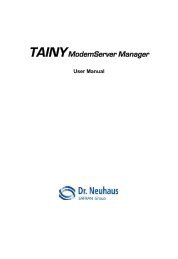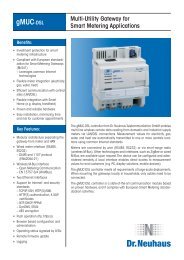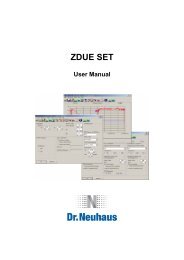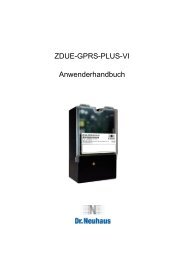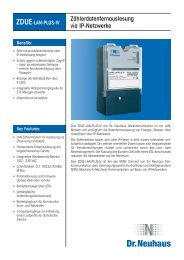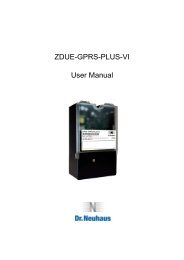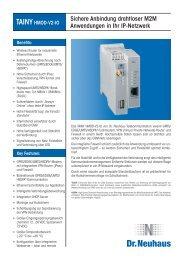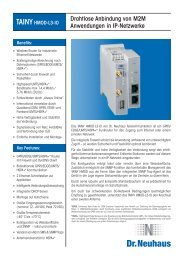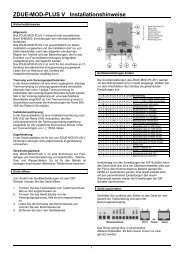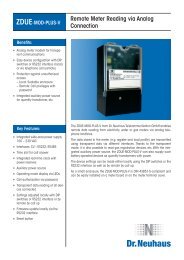tainy hmod-v3-io, tainy hmod-l3-io - Dr. Neuhaus ...
tainy hmod-v3-io, tainy hmod-l3-io - Dr. Neuhaus ...
tainy hmod-v3-io, tainy hmod-l3-io - Dr. Neuhaus ...
Create successful ePaper yourself
Turn your PDF publications into a flip-book with our unique Google optimized e-Paper software.
Security funct<strong>io</strong>ns<br />
Protocol Select the protocol for which this rule will be valid. The following<br />
select<strong>io</strong>ns are available: TCP, UDP, ICMP. If you select All, the<br />
rule is valid for all three protocols.<br />
Note<br />
If you select All for protocol, a port assignment is not effective.<br />
From IP Enter the IP address of the external remote stat<strong>io</strong>n that is<br />
allowed to send IP packets to the local network. Do this by<br />
specifying the IP address or an IP range for the remote stat<strong>io</strong>n.<br />
0.0.0.0/0 means all addresses.<br />
To specify a range, use the CIDR notat<strong>io</strong>n - see Chapter 11.<br />
From port Enter the port from which the external remote stat<strong>io</strong>n is allowed<br />
to send IP packets.<br />
(is only evaluated for the protocols TCP and UDP)<br />
To IP Enter the IP address in the local network to which IP packets<br />
may be sent. Do this by specifying the IP address or an IP range<br />
of the applicat<strong>io</strong>n in the local network. 0.0.0.0/0 means all<br />
addresses.<br />
To specify a range, use the CIDR notat<strong>io</strong>n - see Chapter 11.<br />
To port Enter the port to which the external remote stat<strong>io</strong>n is allowed to<br />
send IP packets.<br />
Act<strong>io</strong>n<br />
Select how incoming IP packets are to be handled:<br />
Accept – The data packets can go through,<br />
Reject – The data packets are rejected, and the sender receives<br />
a corresponding message.<br />
<strong>Dr</strong>op – The data packets are discarded without any feedback to<br />
the sender.<br />
Firewall Rules (Outgoing) The Firewall Rules (Outgoing) are used to define how to handle IP packets<br />
that are received from the local network. The source is an applicat<strong>io</strong>n in the<br />
local network. The destinat<strong>io</strong>n is an external remote stat<strong>io</strong>n, e.g. on the<br />
Internet or in a private network.<br />
In the factory setting, no outgoing firewall rule is set initially, i.e. no IP<br />
packets can go through.<br />
New Adds an addit<strong>io</strong>nal firewall rule that you can then fill out.<br />
Protocol Select the protocol for which this rule will be valid. The following<br />
select<strong>io</strong>ns are available: TCP, UDP, ICMP. If you select All, the<br />
rule is valid for all three protocols.<br />
From IP Enter the IP address of the local applicat<strong>io</strong>n that is allowed to<br />
send IP packets to the external network. Do this by specifying<br />
the IP address or an IP range for the local applicat<strong>io</strong>n. 0.0.0.0/0<br />
means all addresses.<br />
To specify a range, use the CIDR notat<strong>io</strong>n - see Chapter 11.<br />
From port Enter the port from which the local network is allowed to send IP<br />
packets. Do this by specifying the port number.<br />
(is only evaluated for the protocols TCP and UDP)<br />
To IP Enter the IP address in the external network to which IP packets<br />
may be sent. Do this by specifying the IP address or an IP range<br />
of the applicat<strong>io</strong>n in the network. 0.0.0.0/0 means all addresses.<br />
To specify a range, use the CIDR notat<strong>io</strong>n - see Chapter 11.<br />
TAINY xMOD Page 53 of 111





